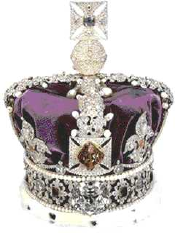I noticed adverts for a 5.3% bond from the UK’s Royal Bank of Scotland in some old newspapers while catching up today.
After doing some research, I’ve established that the so-called ‘Royal Bond’ began trading at the start of September 2009, with a lifespan of six years.
In summary:
- It’s effectively a corporate bond, though the adverts were a little unclear. (Specifically, it’s a ‘redeemable certificate’). Don’t mistake it for a savings bond.
- The 5.3% coupon is paid annually, on the 26th August.
- Interest is paid gross.
- The bond matures in August 2015 at par. It cannot be called by RBS.
- You can buy it via your online broker – the ticker is RBS53.
- It’s senior debt; RBS is rated A+ by Standard and Poors.
The bond was priced at launch at £100, but it’s already been bid up in price, reducing the yield.
As of close today the bid/offer was £101.15/£101.90, for a 0.75% spread.
You’d also have to pay your usual broker’s fee, but there’s no stamp duty.
Is the Royal Bond good value?
On the face of it, yes.
Adjusting for the new price of £101.90:
- The running yield would be (5.30/101.90) x 100 = 5.2%
By my rough calculation, the redemption yield on holding the bond to maturity (when it would be redeemed for its original value of £100 – i.e. for a small loss) would be something like 4.9%.
This yield is about 2.5% higher than five-year gilts, which seems fair compensation for the extra risks. It’s also a little higher than most comparable corporate bonds.
RBS is a troubled bank, but this tranche of debt should be very safe, and with the bank 80% owned by the Government it’s hard to imagine it could go bust to the extent that RBS53 bondholders wouldn’t be repaid.
It’s certainly much safer than the King of Shaves bond we looked at a few weeks ago, which was also directly aimed at private investors.
For the avoidance of doubt, however, you should appreciate your money is certainly at risk and you wouldn’t be entitled to FSA compensation.
Is the Royal Bond a good investment?
The bond may be good value, but personally I’m not very tempted.
There are fixed rate cash savings accounts offering 5% over five-years, with no risk to your capital.
You can exit most of them for an interest penalty if you really have to (and it’s unlikely to cost much more than the dealing spread on the RBS Royal Bond).
Of course, you also give up the chance of short-term capital gains if the Royal Bond continues to increase in price.
Also, if you want exposure to corporate bonds, then you should hold a nicely diversified range, or else buy them through a fund (painful, since costs of even 1% eat into your returns). You should probably not risk buying the Royal Bond alone.
Remember, I’m not a financial adviser. Do your own research and seek advice if you need it.







There are two Lloyds bonds which are yielding a shade over 6% (GRY) at the moment, with ~5 years till redemption – one slightly below, one slightly above par. I’d say these are probably the closest comparable to the RBS bond, due to the significant government holding?
http://www.selftrade.co.uk/market-data/gilts-bonds/bonds.php
Good spot Lemondy, thanks. Are they callable? The RBS bonds are not; that could account a little for the difference? The Lloyds offerings certainly look better at first glance.
Hmmm, now you’re testing me. I don’t think the Lloyds bonds can be called before maturity.
Ah, but the Lloyds bonds are Tier 2 debt, whereas the RBS bond is Senior. That probably accounts for it.
I really wish there was more coverage of bonds around, I feel like it’s one of those areas of investing where there are hidden secrets being exploited only by those in the know!
For instance, why are there Nationwide PIBS trading at a GRY/call-to-yield of 8/9%. Seems too good to be true!
Hi again Lemondy. Yep, it’ll be the security of the issue that accounts for it. Thanks for coming back to us with research findings. 🙂
Re: Nationwide PIBS, this is because some PIBS defaulted this year (probably not the correct technical term, but just about covers it!) I think it was Bradford and Bingley, from memory. So PIBS are no longer seen as ultra-safe gilt-like investments bought by pensioners, but rather more like timeshares flogged by a man in dark glass on the Costa Brava. That said, the Nationwide ones are surely pretty secure?
I agree about the lack of coverage. I’ve been looking at Standard Chartered’s long and perpetual bonds, which on the surface offer great yields, but call options on the long for instance means you have to assume that they’re going to be called for a capital loss, and that knocks several percent off the yield.
One great site is: http://www.fixedincomeinvestor.co.uk. Perhaps I should write a post about data sources for corporate bonds, but I’m not an expert.
David Swensen argues its harder to evaluate corporate bonds than equities, because you need to understand the company as with equities, what also would happen if it failed, *and* the nuances of the debt market with bonds.